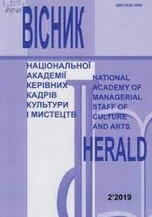ДУХОВНІ ВИТОКИ АРІЇ, ЇЇ ФОРМУВАННЯ В ЄВРОПІ ТА КИТАЇ
SPIRITUAL ORIGINS OF ARIA, ITS FORMATION IN EUROPE AND CHINA
Author(s): Sun Zhui ShanSubject(s): Cultural history, Music, History of Art
Published by: Національна академія керівних кадрів культури і мистецтв
Keywords: Aria; genre in music; opera, song; chant; hymn;
Summary/Abstract: The purpose of the work is to trace the genesis of the aria typology and its inherent expressiveness of aria singing in its pre- and non-opera existence, comparing relevant materials from the history of the genre in Europe and China. As a methodological basis, we put forward the intonation approach of B. Asafyev's school in Ukraine, as it developed in the works of O. Markova, O. Muravska, Liu Bing Jiang, with emphasis on hermeneutic and stylistic-comparative analysis. The scientific novelty of the study is caused by the historical novelty of emphasizing symbolic and religious beginnings in culture and art, which was traditionally ignored in the classical for Europe period of New time, as well as by the fact that, for the first time in Ukrainian and Chinese musicology, about hymnographic and song-chant forming of syncretism are put in logical chain of receivership information, from which an aria was born in the 12th-13th centuries in China and the 15th-16th centuries in Europe, which was later absorbed into the opera at the level of an essential component of the composition. Conclusion. The culture of the aria as a finished expressive quality and arias as a type of singing developed into the spiritual activity in the diametrically opposed cultural formations of China and Europe. They are historically connected by their appearance only in them in the planetary scope of the operatic action by its singing saturation from the beginning to the end of the performance. For China, the concept of forming an aria from the ritual syncretism of a hymnsong- aria is proven. For the European thinking, the awareness of the aria as a derivative of the Byzantine hymnography and liturgical-canto song with vocality inseparable from it was the achievement of musicological developments of the last decades. The adoption of such a concept, developed in the presented work, significantly corrects the “generic emphasis” of the expressiveness of the aria, traditionally considered in the context of the specifics of the operatic action.
Journal: Вісник Національної академії керівних кадрів культури і мистецтв
- Issue Year: 2022
- Issue No: 3
- Page Range: 253-259
- Page Count: 7
- Language: Ukrainian

